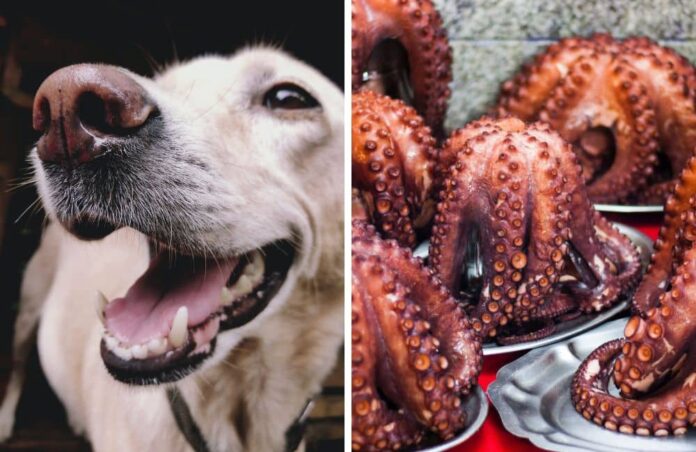Hey there fellow dog parents! Ever caught yourself wondering if your four-legged bestie can chow down on some tentacled goodness? Well, you’re not alone! Today, we’re diving deep (pun intended!) into everything you need to know about feeding octopus to your dog.
TL;DR: The Quick Answer
Yep, dogs can totally eat octopus! It’s actually pretty good for them when prepared correctly But hold your horses – there’s some important stuff you gotta know first!
Why Octopus Could Be Your Dog’s New Favorite Treat
The Nutritional Goldmine
Listen up because octopus is literally packed with awesome stuff your doggo needs
- Protein: Like, tons of it! We’re talking high-quality, lean protein that’s perfect for those muscle-building needs
- Omega-3s: These fatty acids are basically brain food for your pup
- Vitamins: B12, B6, and other good stuff
- Minerals: Iron, copper, and selenium – the whole gang’s here!
Health Benefits That’ll Make Your Tail Wag
- Supports muscle development
- Helps maintain healthy skin and coat
- Boosts brain function
- Strengthens immune system
- Great for joint health
The Not-So-Fun Part: Risks and Precautions
Watch Out For These Red Flags! ⚠️
-
Raw Octopus = Big No-No
- Could contain nasty bacteria
- Might have parasites (ew!)
- Risk of food poisoning
-
Choking Hazards
- Those tentacles can be tricky
- Always cut into small, manageable pieces
-
Seasoning Dangers
- Skip the garlic and onion
- No salt needed
- Keep it plain, keep it simple
How to Serve Octopus to Your Dog (The Right Way!)
Preparation Tips That’ll Save Your Tail
-
Cooking Methods
- Boiling: Your safest bet
- Grilling: OK, but skip the seasonings
- Steaming: Perfect for keeping nutrients
-
Serving Size Guidelines
- Small dogs: 1-2 small pieces
- Medium dogs: 2-3 pieces
- Large dogs: 3-4 pieces
- Start small and watch for reactions!
The Perfect Prep Recipe
- Clean the octopus thoroughly
- Boil in plain water for 20-30 mins
- Let it cool completely
- Cut into small, bite-sized pieces
- Remove any tough parts
When to Say “No” to the Tentacles
Some doggos should probably skip the octopus if they:- Have seafood allergies- Are on specific diets- Have sensitive tummies- Are pregnant or nursing
Real Talk: What Dog Parents Are Saying
“My Lab absolutely loves octopus! Just gotta make sure it’s cooked right.” – Sarah, proud dog mom
“Started giving my Husky small pieces as treats – his coat’s never looked better!” – Mike, pet parent
Pro Tips for First-Time Octopus Feeders
-
Start Slow
- Introduce gradually
- Watch for allergic reactions
- Monitor digestion
-
Quality Matters
- Fresh is best
- Frozen is OK too
- Avoid processed options
-
Storage Smarts
- Keep refrigerated
- Use within 2 days
- Freeze portions for later
Common Mistakes to Avoid
- Serving it too hot
- Adding seasonings
- Giving too much at once
- Not cutting pieces small enough
- Using pre-seasoned octopus
Alternatives If Octopus Isn’t Your Thing
Not sure about octopus? Try these instead:- Fish (salmon, sardines)- Shrimp (cooked, plain)- White meat chicken- Turkey
The Bottom Line
Octopus can be a super healthy addition to your dog’s diet when done right. Just remember:- Cook it properly- Keep it plain- Serve in moderation- Watch for reactions- Cut into appropriate sizes
FAQ: Quick Answers to Common Questions
Q: Can puppies eat octopus?A: Better wait till they’re older and start with tiny amounts.
Q: How often can I feed octopus to my dog?A: 1-2 times a week is plenty!
Q: Can I use canned octopus?A: Fresh or frozen is better – canned often has additives.
Final Thoughts
Adding octopus to your dog’s diet could be a game-changer for their health and happiness. Just remember to be smart about it and always put safety first. Your furry friend’s tummy will thank you!
Remember to always check with your vet before making any major changes to your pup’s diet. Every dog is different, and what works for one might not work for another.
Now go forth and explore the world of doggy-safe seafood! Your four-legged friend might just discover their new favorite treat!
Disclaimer: This article is for informational purposes only. Always consult with your veterinarian before introducing new foods to your dog’s diet.












